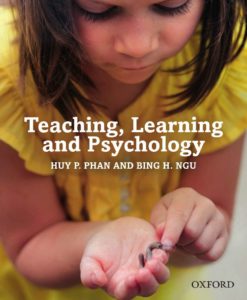Teacher well-being has been in the news recently, with Education Minister Dan Tehan saying teachers must be better trained to deal with the pressure of difficult classrooms and the physical and verbal abuse they experience.
This month, the ABC reported that teachers and principals were under increasing pressure as a result of the anxiety epidemic being experienced by students, and a school principal was driven to write to parents to encourage them to improve their behaviour towards teachers.
While abuse should not be tolerated, is there something that teachers can do to improve their own well-being in such a climate? Two Oxford University Press authors discuss the role that positive psychology can play in improving the well-being of teachers.
By Huy P. Phan, Professor of Educational Psychology, Learning and Teaching in the School of Education, University of New England, and Bing H. Ngu, Senior Lecture of Mathematics Education in the School of Education, University of New England and authors of Teaching, Learning and Psychology (Oxford University Press)
The teaching profession is rewarding, but it can also be stressful. Burnout is something that many teachers will have experienced or will experience in their careers. You only have to do a quick Google search to see the many academic and news articles that have been written on this topic. For example, an article by Jane Caro in 2017 highlights the emotional cost of being a teacher. It is somewhat misleading for us to infer that the main role of any teacher is to ensure that their students achieve exceptional ATAR scores, and/or results for standardised exams. As Jane Caro writes, a good teacher must also be a ‘counsellor, nurse, sociologist, sounding board, motivator, leader, guide, and role model’. Because of this complexity, some teachers regrettably opt to walk away from the teaching profession after 4 to 5 years.
As a result, in our recent book, Teaching, Learning and Psychology, we introduced a chapter titled ‘Teacher Well-Being’. The writing of this chapter came about because of our research interests and teaching in the broad areas of positive psychology, motivation, and student subjective well-being. We believe teacher well-being is an important topic for discussion because the emphasis is related to the teacher – it is about the well-being of a teacher, and if a teacher cannot perform at their best, the student also suffers. We profess that we do not have all the answers on this topic. So much has been written about the causes of teacher burnout, and why some choose to leave the teaching profession. What we are interested in is how do we help teachers to experience positive well-being? Positive teacher well-being, in this case, may encompass several important facets – for example:
- to experience positive emotions (e.g. happiness)
- to have positive outlooks of life and in life, regardless of current difficulties
- to be optimistic and to be hopeful
- to feel good about oneself
- to be able to interact with and to relate to others
- to value and to appreciate oneself
- to value and to appreciate others, regardless of how one may feel
- to be active and to be able to function effectively
- to be able to think clearly and to be able to self-regulate
It is not always easy to be able to experience positive subjective well-being at school. There are days when we have setbacks, when we disagree, when we feel stressed, pessimistic, etc. This is understandable, especially within the complex context of schooling.
Positive psychology offers us an interesting theoretical insight into the proactivity of human behaviours. Rather than placing the emphasis on the negativities of life, positive psychology instead focuses on personal growth, a state of flourishing, inner virtues, resilience, and proactive engagement. Positive psychology, put simply, is related to a person capitalising on his or her internal psychological processes, as well as the contextual environmental surroundings to move forth and progress in life. For example, from the perspective of positive psychology, a child may make a concerted attempt to use her existing modest grades at school to improve herself for mastery reasons. In a similar vein, let us consider the case of teacher subjective well-being. How can we relate positive psychology to the encouragement and fostering of enriched teacher subjective well-being? This question, as you can see, is concerned with theoretical understanding of different applied educational practices that we could consider. In our chapter, for example, we call for a focus on the local community to assist, and the use of coaching and mentoring. Timely feedback, exposure to an appropriate role model, and scaffolding are all important sources of teacher self-efficacy, which forms an important element of subjective well-being.
Over the past couple of years, working collaboratively with colleagues from Taiwan, we have delved into the importance of mindfulness and meditation. This research development is ongoing and seeks to understand spirituality, self-actualization, and the meaning of life, encompassing the tenets of positive psychology. Can we use Eastern ideas about mindfulness to foster the enrichment of teacher subjective well-being at school? Perhaps so. The teaching of meditation from an Eastern perspective, in brief, delves into the understanding that everything is here and now. We refer to this as ‘the present moment’. We do not think about past events and situations, nor do we contemplate what the future will hold. We only focus on the present moment – that is, our present state of mind. Of course, meditation from an Eastern perspective is much more complex than this. It is also about a person wanting to reach an internal state of enlightenment (or nirvana). According to our Taiwanese colleagues, some of whom are Buddhist nuns and monks, enlightenment is about inner satisfaction, peace, ease and calmness, and happiness. It is about a person wanting to reach a state of internalisation and self-actualisation. So, overall, how do we consolidate this understanding and apply it to the teaching profession? It is not an easy feat.


Leave a Reply